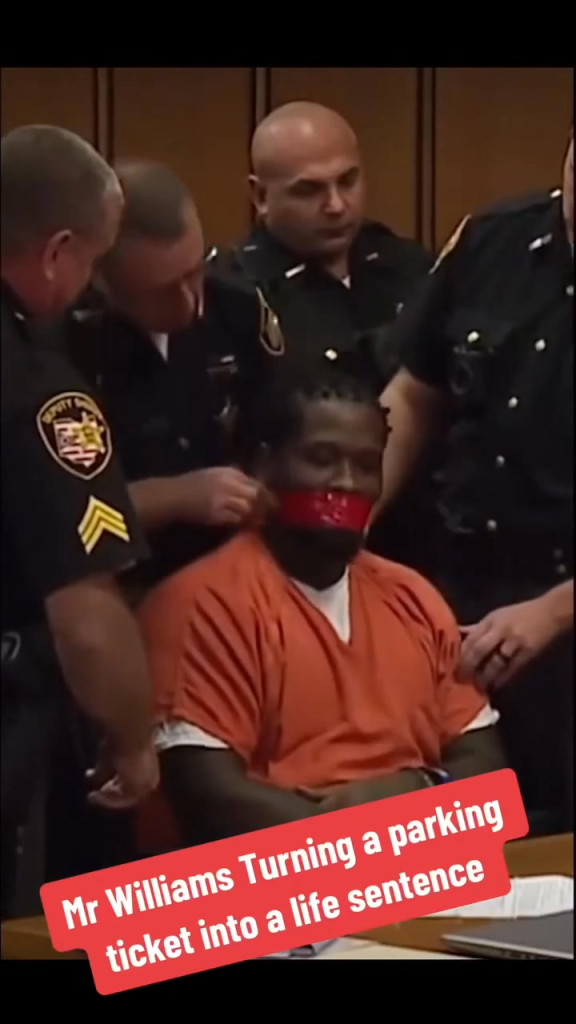Courtrooms are often viewed as the final stage in a long process of dispute resolution—a place where order, fairness, and respect for the rule of law are supposed to prevail. Yet sometimes, what begins as a relatively minor matter can spiral into something far greater. A recent case, now widely discussed across social media and news platforms, demonstrates exactly how quickly a simple issue can transform into a highly controversial legal and ethical debate.
This incident began with nothing more than a parking violation. What should have been handled with a routine fine turned into a courtroom drama that shocked onlookers, left the legal community divided, and sparked debates among ordinary citizens about respect, authority, and the limits of judicial power.
The Beginning: A Simple Parking Violation
Parking tickets are among the most common citations issued by local authorities worldwide. In most cases, they are inconvenient but relatively harmless—a small fine, a reminder to obey local ordinances, and then life continues as normal.
For the individual at the center of this story, however, that was not how events unfolded. The man, whose name has not been disclosed in many reports, appeared before a judge after being cited for a minor parking infraction. Many expected the hearing to last just a few minutes. After all, parking fines are routine business for the courts.
But almost immediately, the tone of the hearing shifted.

The Courtroom Exchange
Video footage from the hearing shows the man becoming increasingly argumentative. Rather than calmly explaining his side of the situation, he repeatedly interrupted the judge. His voice grew louder, and he disregarded repeated instructions to remain quiet until spoken to.
The presiding judge issued several warnings, reminding him that courtroom proceedings require respect and order. Despite these cautions, the man continued to raise his voice and challenge the authority of the court.
At first, those present assumed the situation might de-escalate with a firm reminder. However, the more the judge attempted to regain control, the more disruptive the defendant became.
The Turning Point: An Unusual Decision
After numerous interruptions and a refusal to comply with standard courtroom etiquette, the judge made a decision that stunned many observers. Deputies were ordered to place tape over the man’s mouth so the proceedings could continue without further disruption.
This moment, captured on video, quickly circulated online. Some viewers expressed disbelief at the unusual measure, while others applauded the judge for taking action to maintain control of the courtroom.
Escalation of Charges
What might have ended as a small fine for the original parking violation soon evolved into something much more serious. The man’s repeated interruptions, refusal to follow instructions, and confrontational behavior led the judge to impose additional contempt-of-court charges.
Contempt of court is a legal mechanism designed to ensure proceedings can continue without obstruction. It may be applied when someone disrespects the court, disrupts proceedings, or refuses to comply with lawful orders. In this case, the contempt charges stacked up quickly.
Instead of walking away with a modest fine, the defendant now faced the possibility of jail time and a criminal record that could follow him for years.
A Viral Moment
Once the footage appeared online, the incident spread rapidly. Clips were shared across major platforms, attracting millions of views. Social media became a battleground for public opinion.
Some viewers sided with the judge, arguing that maintaining order is essential. They pointed out that the defendant had been given multiple opportunities to calm down, yet chose to escalate the situation.
Others, however, saw the judge’s decision as excessive. Critics argued that using tape, even as a temporary measure, crossed ethical boundaries and raised questions about dignity and human rights in the courtroom.
Public Reaction: A Nation Divided
The video provoked debates not only about this specific case but also about larger themes:
- Authority and Respect in the Courtroom
- Supporters of the judge stressed that courtrooms cannot function without order. If one person is allowed to speak out of turn, refuse instructions, or shout over others, the entire justice process collapses.
- Human Rights and Judicial Restraint
- Opponents argued that even difficult defendants deserve fair treatment. Resorting to physical restraint, especially in such a public and humiliating way, could undermine confidence in the justice system.
- Proportionality of Punishment
- Many asked whether stacking contempt charges for what began as a parking violation was truly fair. Should a minor infraction ever escalate into a potential prison sentence?
Historical Context: Contempt of Court in Action
This was not the first time judges have made unusual rulings in moments of frustration. Around the world, there are documented cases where judges have fined, jailed, or even temporarily removed disruptive individuals from courtrooms.
However, the use of tape or gagging devices is extremely rare. Most judicial systems rely on temporary removal or holding the defendant in custody until they agree to comply. That rarity is part of why this case gained so much attention—it was an extraordinary decision, not a routine one.
Legal Experts Weigh In
Lawyers and legal scholars were quick to offer commentary. Some suggested that the judge’s actions, while unconventional, might still fall within their broad authority to maintain order. Others argued that it could open the door to appeals, as defense attorneys may claim that the defendant’s rights were violated.
One legal analyst noted that “judges are human beings too. They face daily challenges of balancing authority with fairness. But unusual solutions, especially those that appear degrading, risk undermining the very respect they are trying to enforce.”
Ethical Dilemmas
Beyond legality, the incident also raised ethical questions. Should humiliation ever be used as a tool of discipline in a court of law? Even if effective in the short term, does it erode long-term trust in the system?
These questions are not easy to answer. They touch on fundamental values: respect for authority versus protection of dignity, efficiency of proceedings versus human rights, and justice as a system of order versus justice as a system of fairness.
The Human Element
It is important not to forget the human side of this story. For the defendant, this experience will likely be life-changing. What began as a parking ticket has now placed him at the center of national attention.
For the judge, too, the incident may have lasting consequences. While some hail the decision as courageous, others criticize it as heavy-handed. Either way, it will likely be remembered as one of the defining moments of their career.
Broader Implications
This case is about much more than one man and one judge. It speaks to how society views authority, discipline, and justice. In an era where nearly every moment can be recorded and shared online, decisions made in the heat of the moment can echo far beyond the courtroom.
It also underscores the importance of personal responsibility. Had the defendant remained calm and respectful, he might have left with nothing more than a fine. Instead, his refusal to follow the rules turned a minor matter into a serious legal ordeal.
Lessons for the Public
For everyday citizens, the incident serves as a reminder of several key lessons:
- Respect the Courtroom
- Regardless of personal feelings, maintaining composure in court is essential. Even small outbursts can carry significant consequences.
- Consequences Escalate Quickly
- What begins as a minor issue can escalate into something much larger if rules are ignored.
- Authority Will Be Enforced
- Judges have broad powers to maintain order. Whether one agrees with their methods or not, those powers are legally recognized.
- Debates Continue Beyond the Courtroom
- In today’s digital age, courtroom behavior is no longer confined to those physically present. Videos spread quickly, shaping public opinion on a national and even global scale.
Conclusion: A Case That Will Be Remembered
What began as a simple parking ticket ended with a legal and ethical debate that captured widespread attention. The man’s refusal to follow courtroom rules led to an extraordinary decision by the judge, sparking outrage, support, and everything in between.
Ultimately, this case illustrates the delicate balance between maintaining order and respecting individual rights. It shows how quickly situations can escalate when authority is challenged, and how one unusual decision can ignite nationwide debate.
Whether one believes the judge acted within reason or went too far, the lesson is clear: in the halls of justice, respect and restraint are not optional—they are essential.


